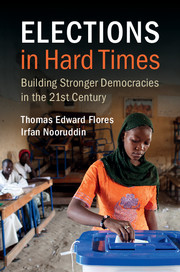Book contents
- Frontmatter
- Dedication
- Epigraph
- Contents
- List of figures
- List of tables
- Preface
- Part I From Elections to Democracy: Theory and Evidence
- 1 Introduction
- 2 Why Have Elections Failed to Deliver? An Answer
- 3 The Third Wave(s) and the Electoral Boom
- Part II Challenges Facing Elections in Developing Countries
- Part III Democracy Promotion for the Twenty-first Century
- Appendix A Data Appendix: Sample, Variables, Sources
- Appendix B Main Statistical Results
- Notes
- Bibliography
- Index
1 - Introduction
from Part I - From Elections to Democracy: Theory and Evidence
Published online by Cambridge University Press: 05 September 2016
- Frontmatter
- Dedication
- Epigraph
- Contents
- List of figures
- List of tables
- Preface
- Part I From Elections to Democracy: Theory and Evidence
- 1 Introduction
- 2 Why Have Elections Failed to Deliver? An Answer
- 3 The Third Wave(s) and the Electoral Boom
- Part II Challenges Facing Elections in Developing Countries
- Part III Democracy Promotion for the Twenty-first Century
- Appendix A Data Appendix: Sample, Variables, Sources
- Appendix B Main Statistical Results
- Notes
- Bibliography
- Index
Summary
The largest competitive election in world history took place in India during April and May 2014. It featured roughly 563 million voters (out of 815 million eligible citizens), choosing from among 8,251 candidates, representing nearly three dozen political parties, competing for 543 seats in the Lok Sabha (the Indian Parliament's lower house), over thirty-five days and nine phases. The results, though anticipated in pre-election polls, sent shockwaves throughout India. The Indian National Congress party, led by Rahul Gandhi, scion of the Nehru- Gandhi family, suffered its worst loss since independence – it won only 44 seats, compared to the 206 seats won in the election five years earlier. The Bharatiya Janata Party (BJP) won enough seats to form the first majority government India had experienced since 1984. Its National Democratic Alliance, a coalition with 20 other parties, holds 336 seats. Sporadic violence did force the Election Commission to order re-polling in certain locales and allegations of vote-buying were common, if unverified. Yet few questioned the legitimacy of this complex vote. The BJP's leader Narendra Modi took power as the fifteenth Prime Minister of India on May 26, 2014 after Gandhi conceded Congress's crushing defeat and Prime Minister Manmohan Singh peacefully relinquished power.
India's 2014 elections extended a long legacy of competitive elections. India has held sixteen competitive national elections since its independence from Great Britain in 1947, beginning with the 1951– 1952 elections that first brought the Congress party, led by Jawaharlal Nehru, to political power. Though the Congress party dominated Indian politics for several decades – hardly a surprise given the party's central role in the nation's struggle for independence – it has placed second or lower in four of the last seven general elections. Its first electoral loss in 1977 followed “the Emergency” in 1975, in which President Fakhruddin Ali Ahmed declared a state of emergency, allowing Prime Minister Indira Gandhi to suspend elections, imprison opposition leaders, and censor newspapers criticizing her rule. No government in India has attempted such an autocratic gambit since.
Just one year before India's 2014 election, Pakistan held elections on May 11, 2013. That two neighboring countries born in 1947 with a common history of British colonial rule held elections in consecutive years speaks to the potential for democratic hegemony in South Asia. However, these similarities do not obscure the striking contrasts between elections in India and Pakistan.
- Type
- Chapter
- Information
- Elections in Hard TimesBuilding Stronger Democracies in the 21st Century, pp. 3 - 25Publisher: Cambridge University PressPrint publication year: 2016



